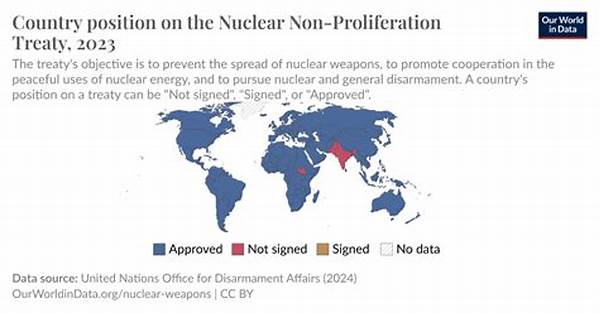The Nuclear Non-Proliferation Treaty (NPT) is a pivotal international accord that aims to prevent the spread of nuclear weapons, promote disarmament, and facilitate the peaceful use of nuclear energy. Since its inception in 1968 and enforcement in 1970, the treaty has garnered widespread adherence, with 191 countries becoming parties. The treaty is underpinned by three primary pillars: non-proliferation, disarmament, and cooperation in peaceful nuclear activities. This article delves into the multifaceted impacts of the NPT on global security and international relations.
Security and Stability
The nuclear non-proliferation treaty impacts global security significantly by curbing the spread of nuclear weapons. By establishing a framework for non-proliferation, the NPT has contributed to global stability and reduced the threat of nuclear conflict. Countries that agree to its terms make a commitment to refrain from developing nuclear weapons, thus limiting the number of nuclear-armed states. Moreover, the treaty enhances transparency among nations through safeguards and inspections, thereby reinforcing mutual trust. This has been instrumental in preventing regional arms races and maintaining a balance of power. The nuclear non-proliferation treaty impacts are evident in regions previously strained by geopolitical tensions, where the treaty has acted as a deterrent against the escalation of arms.
Disarmament Efforts
1. The nuclear non-proliferation treaty impacts global disarmament by serving as a platform for nuclear states to pursue arms reduction agreements.
2. Through periodic review conferences, the treaty encourages disarmament dialogue, fostering an environment conducive to negotiating reductions in nuclear arsenals.
3. Signatories are urged to pursue complete disarmament, although this goal remains aspirational and challenging due to geopolitical complexities.
4. The NPT has established verification mechanisms that reinforce compliance, ensuring that disarmament commitments are upheld by participating states.
5. As a result of the treaty, several nuclear states have engaged in bilateral agreements to reduce their nuclear stockpiles, reflecting the NPT’s influence on disarmament.
Peaceful Nuclear Technology
The nuclear non-proliferation treaty impacts not only pertain to security measures but extend to the promotion of peaceful nuclear technology. By facilitating cooperation and technological exchange, the NPT aids countries in harnessing nuclear energy for civilian purposes. Many developing nations benefit from this, as it enables them to access nuclear technology which supports energy generation, medical applications, and agricultural advancements. This aspect of the treaty exemplifies a commitment to using nuclear science for productive and non-threatening means, fostering innovation and development. The peaceful application of nuclear technology, encouraged by the NPT, contributes to economic progress and enhances living standards globally.
Verification and Compliance
Verification mechanisms within the NPT are crucial to ensuring its efficacy.
1. The nuclear non-proliferation treaty impacts are tightly linked to the work of the International Atomic Energy Agency (IAEA), which conducts inspections.
2. The IAEA monitors nuclear facilities and ensures adherence to the treaty’s provisions.
3. Through its safeguarding measures, states are accountable for their nuclear activities, curbing the potential diversion to weapons development.
4. The IAEA’s rigorous inspections also help to detect non-compliance, providing a deterrent effect against treaty violations.
5. The nuclear non-proliferation treaty impacts are further bolstered by the Additional Protocol, granting the IAEA enhanced inspection authority.
6. This enhances the agency’s capacity to uncover illicit nuclear activities and strengthen the treaty’s integrity.
7. Moreover, compliance with the NPT supports diplomatic credibility, encouraging nations to abide by international norms.
8. Verification measures instill confidence in peaceful nuclear use, deterring clandestine weapons programs.
9. The transparency fostered by the treaty’s verification regime reassures neighboring states, reducing regional tensions.
10. Globally, the nuclear non-proliferation treaty impacts enhance trust and cooperation among member states.
Diplomatic Leverage
The diplomatic leverage afforded by the nuclear non-proliferation treaty impacts international relations by fostering cooperation and dialogue. Countries participating in the NPT are inclined towards diplomacy to resolve disputes, building a culture of communication and collaboration. The treaty provides an avenue for states to engage with one another on nuclear issues, promoting conflict resolution through peaceful means. The international community benefits from a structured forum for discussion and negotiation, reinforcing the idea that diplomacy can outweigh hostility. Through dialogue facilitated by the NPT, states can address complex security concerns and create frameworks for mutual understanding and cooperation. This diplomatic channel reduces the likelihood of nuclear crises, contributing to a stable international environment.
Challenges and Criticisms
Nonetheless, the nuclear non-proliferation treaty impacts have been subject to challenges and criticisms. One prominent issue is the division between nuclear-armed states and non-nuclear states, creating perceived inequities. Some argue that nuclear states have not made sufficient progress towards disarmament, leading to frustration among non-nuclear states. Additionally, nations outside the treaty pose a challenge, as they are not bound by its framework, thereby limiting its global reach. The treaty also faces difficulties in addressing emerging nuclear technologies and non-state actors, necessitating continual adaptation. Despite these challenges, the NPT remains a cornerstone of global non-proliferation efforts, and ongoing commitment from all parties is required to address its shortcomings effectively.
Conclusion
In conclusion, the nuclear non-proliferation treaty impacts are far-reaching, significantly contributing to global peace and security while promoting the responsible use of nuclear technology. Through its focus on non-proliferation, disarmament, and peaceful cooperation, the NPT has established itself as an essential instrument in maintaining international stability. It fosters a climate of trust and diplomacy, encouraging states to engage constructively on nuclear issues. Despite facing criticism and encountering challenges, the treaty’s framework has endured as a vital component of global governance. Continued dedication to the principles of the NPT is imperative in ensuring its lasting impact. It is incumbent upon the international community to address challenges proactively and enhance the treaty’s efficacy for future generations, ensuring a secure and less proliferation-prone world.





